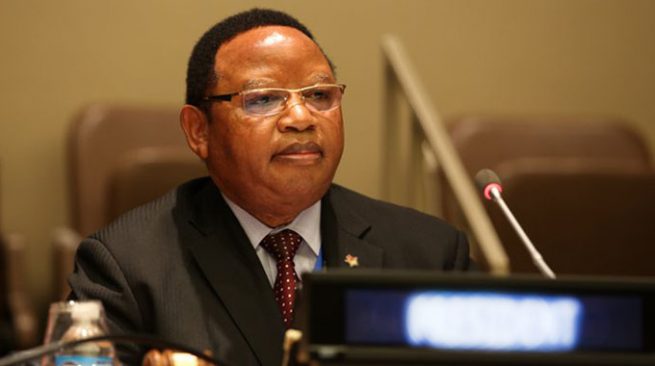Shava demands $100k before assuming his duties

Foreign Affairs Minister, Fredrick Shava
NEWLY-APPOINTED Foreign Affairs and International Trade minister Frederick Shava refused to assume duty for over a month after taking oath of office, demanding payment of about US$100 000 he was owed by government in salaries and allowances which accrued from the time he was Zimbabwe’s ambassador to the United Nations (UN), it has emerged.
Highly-placed government sources confided to the Zimbabwe Independent this week that Shava, who was sworn in as minister on March 2, only assumed duty on Tuesday last week after the government relented to his demands and cleared his ambassadorial salary arrears.
President Emmerson Mnangagwa appointed Shava as Foreign Affairs minister on February 9, replacing the late Sibusiso Moyo who had succumbed to Covid-19 the previous month.
He had served as Zimbabwe’s ambassador to the UN in New York from 2016, where he was also chairperson of the UN Economic and Social Council.
His swearing in was delayed to allow him to become Midlands senator, to satisfy legal requirements for the ministerial appointment. He also needed to wind up his official roles as ambassador.
“He (Shava) said he would not assume work at the ministry unless his salary arrears were cleared. He was owed about US$100 000. He, like other ambassadors across the world, had not received his salary and benefits for over a year,” an official source said.
“The money has since been paid in full and this is why he assumed work on Tuesday last week,” the source said.
The ministry confirmed that Shava only resumed work last week, but claimed it had nothing to do with any salary demands.
“As you are aware, the appointment of the Honourable Frederick MM Shava as the Minister of Foreign Affairs and International Trade needed to follow the due processes to fulfill the provisions of the constitution which resulted in the gazetting of his appointment as Senator of Midlands Province on March 16, 2021,” the ministry’s spokesperson Constance Chemwayi said in written responses to the Independent’s inquiries.
“Thereafter, he immediately left for New York to wind up his official and private affairs as the then permanent representative to the United Nations. Upon his return, he immediately assumed his official position as the Foreign Affairs minister. Never at any point since the announcement of his appointment did the issue of salary arrears arise as a matter of concern that could hinder his assumption of duty,” she said.
Sources, however, disputed the ministry’s official account saying Shava had instead completed winding up his affairs by the time he was sworn in as minister.
“That (the ministry’s explanation) does not make any sense at all. Shava accepted the appointment on February 9 and this was almost a month to allow the government to gazette the Statutory Instrument (SI) for his senatorial seat, as well as to allow him to wind up his business in New York. From the time he was sworn in on March 2, or March 16 when the SI was gazetted, he was supposed to start duty immediately and not wait another month. The truth is that he had long concluded his ambassadorial mission by March 16 and the only reason why it took him until April 20 for him to assume duty was his salary demands,” an official said.
The broke government has for years been struggling to fund operations of foreign missions, resulting in ballooning salary arrears for diplomats and staff.
At some point, the government even announced plans to shut down some embassies.
Shava has a dark past.
He was one of the ministers implicated in the Willowgate corruption scandal in which ministers and senior government officials bought cars from the state-owned Willowvale Motor Industries in the 1980s and resold them to earn huge profits.
In the corruption frenzy, Shava emerged as the busiest wheeler-dealer at the time. He bought and sold so many vehicles that the Justice Wilson Sandura Commission, set up to investigate the scandal, ended up describing him as a car dealer. He realised a mouthwatering US$70 000 in one year, a humongous figure at the time.
The investigation, conducted by a three-member commission led by Justice Sandura, climaxed with the resignations of three cabinet ministers namely, Enos Nkala, Shava and Maurice Nyagumbo, who went on to commit suicide. The then Zimbabwe prime minister, Robert Mugabe, promised to take action against at least three others accused of similar corruption.
To make matters worse, Shava resigned in shame after giving false testimony to the commission. For lying under oath – perjury – he was slapped with a nine-month sentence, without an option of a fine. Mnangagwa then sprang to his rescue, pleading with Mugabe for clemency.
Mugabe acted promptly, issuing a pardon 24 hours later.
— Zimbabwe Independent




